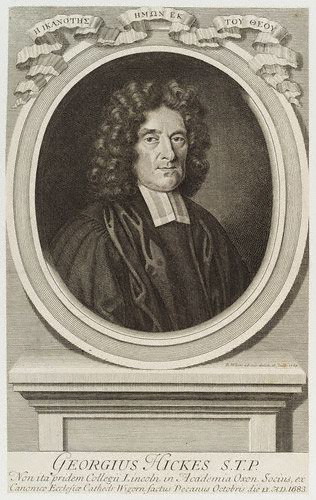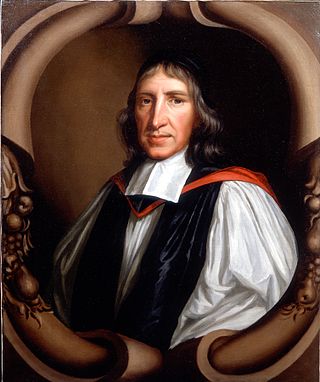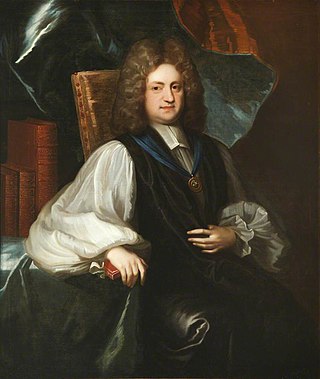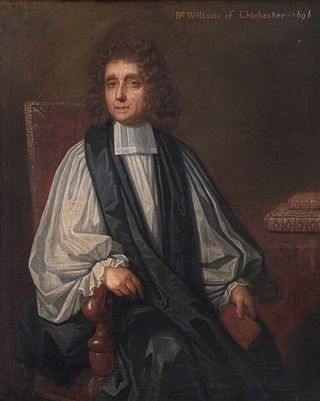Francis Hawkins (c.1643- 19 February 1699) was an Anglican priest at the time of the Glorious Revolution.
Francis Hawkins (c.1643- 19 February 1699) was an Anglican priest at the time of the Glorious Revolution.
At 16 years old, Hawkins joined Peterhouse, Cambridge as a sizar for the period between 1659 and 1660. He studied at Fotheringhay Grammar School where he matriculated in 1661. Then he continued his education at Peterhouse with a B.A. 1663-4; Scholar, 1664; M.A. 1667 and D.D. in 1679. [1]
Hawkins had a wife and eight children, including Francis (1689), William (1686) and George (I704). [1] [2]
In February 1681 a certain Edward Fitzharris, wrote a libelous letter against the king James II of England, for this he was sent to the Tower of London. The Commons subsequently impeached Fitzharris, with the intent of getting the matter presented in court. The chaplain of the Tower, Hawkins, operating in the interests of the court, offered Fitzharris a pardon if he would accuse a member of the House of Commons, Lord Howard of Escrick, of writing the libel against the king. However the Hawkins offer of a pardon was concocted and Fitzharris was executed 1 July 1681. The false confession was published the following day. [b] For his involvement in this matter Hawkins was rewarded with the Deanery of Chichester. [6]
In April 1688, the catholic James II of England [7] re-issued his Declaration of Indulgence [c] and ordered the Anglican clergy to read it in their churches. [8] James appointed an Ecclesiastical Commission to find out the names of the clergy who had refused to read out the declaration. One who did not was Hawkins, who previously had been appointed by James as chaplain to the Chapel of St. Peter within the Tower of London. A post he held for sixteen years. In 1689 James ejected Hawkins from his post for failure to read the declaration, though Hawkins refused to be turned out of his house. [9] [2]

Thomas Sprat, FRS was an English churchman and writer, Bishop of Rochester from 1684.

George Hickes was an English divine and scholar.

Sir Jonathan Trelawny, 3rd Baronet was Bishop of Bristol, Bishop of Exeter and Bishop of Winchester. Trelawny is best known for his role in the events leading up to the Glorious Revolution which are sometimes believed to be referenced in the Cornish anthem "The Song of the Western Men".

The Dean of St Patrick's Cathedral is the senior cleric of the Protestant St Patrick's Cathedral, Dublin, elected by the chapter of the cathedral. The office was created in 1219 or 1220, by one of several charters granted to the cathedral by Archbishop Henry de Loundres between 1218 and 1220.

Matthew Wren was an influential English clergyman, bishop and scholar.

John Lake was a 17th-century Bishop of Sodor and Man, Bishop of Bristol and Bishop of Chichester in the British Isles.
Ralph Brideoake (1612/13–1678) was an English clergyman, who became Bishop of Chichester.

Sir George Treby JP (1643–1700), of Plympton, Devon, and of Fleet Street in the City of London, was Lord Chief Justice of the Common Pleas and six times Member of Parliament for the Rotten Borough of Plympton Erle, Devon, largely controlled by him and his descendants until abolished by the Great Reform Act of 1832.

Charles Trimnell (1663–1723) was an English Anglican bishop. He was a Whig in politics, and known for his attacks on High Church views, writing on the subordination of the Church of England to the state. After the accession of George I of Great Britain in 1714 he was in the royal favour and influential.

Joseph Beaumont was an English clergyman, academic and poet.
Edward Fitzharris was an Anglo-Irish conspirator. His prosecution following the waning of public belief in the Popish Plot hoax became a struggle for jurisdiction involving the courts and the two Houses of Parliament. He was executed for treason in 1681.

John Williams was an English Bishop of Chichester.

Robert Grove (1634–1696) was an English Bishop of Chichester.

William Stanley (1647–1731) was an English churchman and college head, Master of Corpus Christi College, Cambridge, Archdeacon of London and Dean of St Asaph.

Thomas Comber (1645–1699) was an English churchman, Dean of Durham from 1689.
Thomas Manningham (1651?-1722) was an English churchman, bishop of Chichester from 1709.
Edward Jones (1641–1703), was a Welsh Anglican bishop who served as Bishop of Cloyne and Bishop of St Asaph.
Edward Smyth or Smith (1665–1720) was an Irish Protestant churchman, the bishop of Down and Connor from 1699.
William Fleshmonger(? -1541/42), the son of a Winchester College tenant, was born in Hambledon, Hampshire. He was a Doctor of Canon Law and Dean of Chichester during the turmoil of the English Reformation.